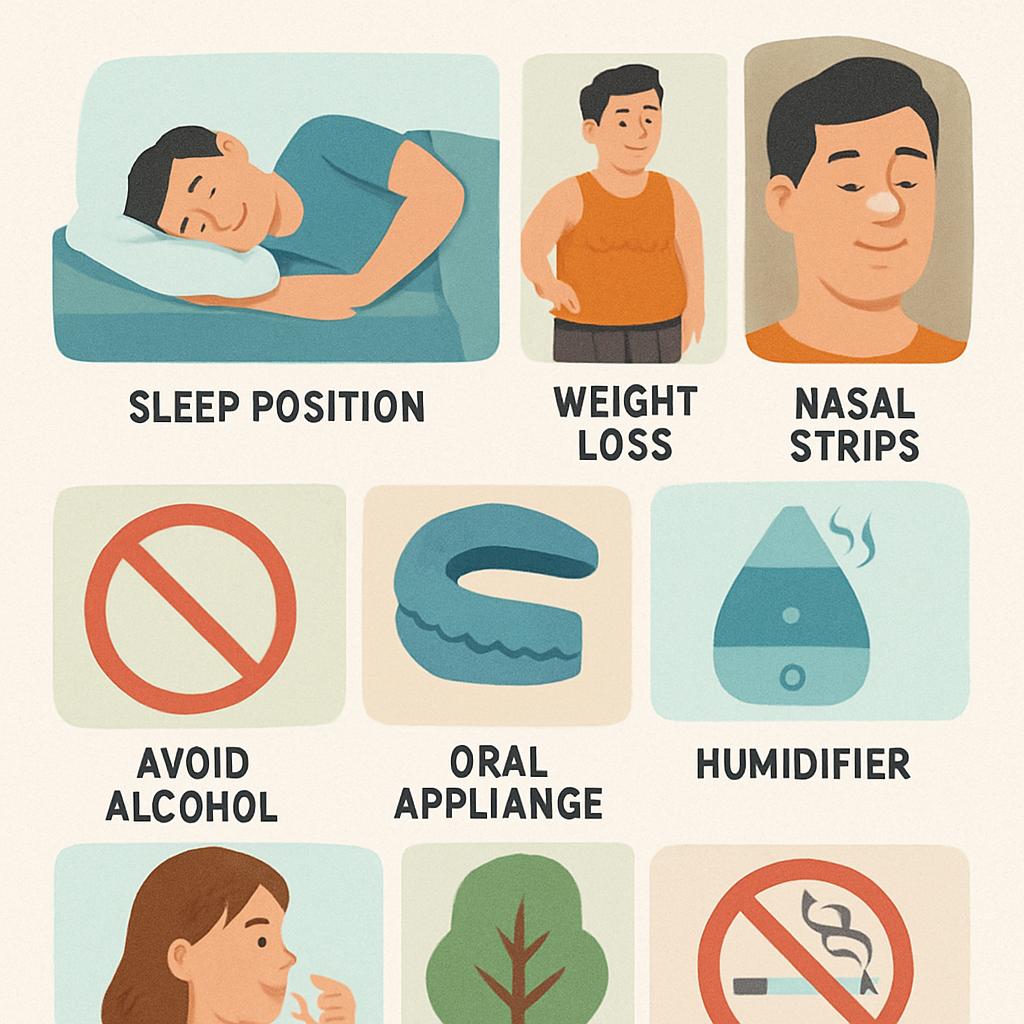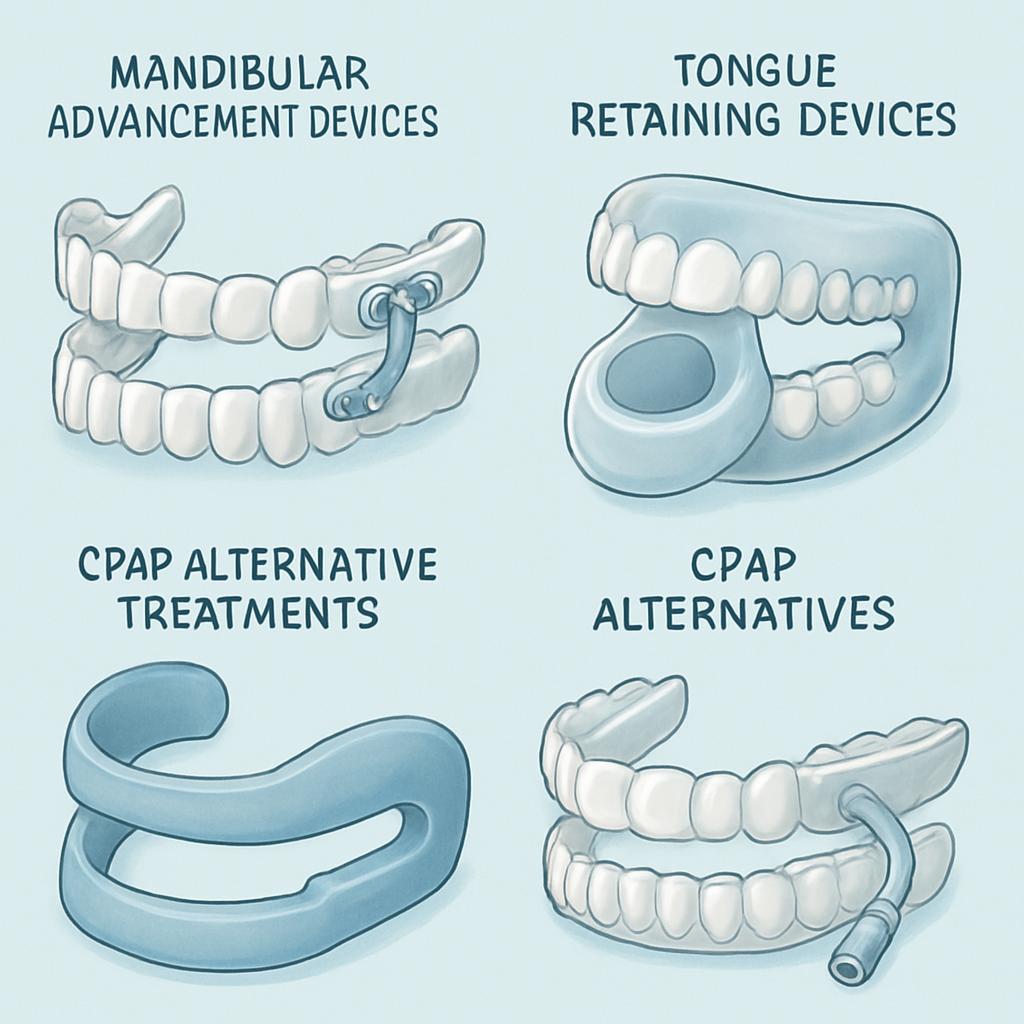
Medical Disclaimer: This article provides educational information about snoring solutions. Always consult with healthcare professionals for proper diagnosis and treatment of medical conditions.
Understanding Your Snoring Pattern
Before diving into solutions, it's important to understand your specific snoring pattern. Different types of snoring require different approaches:
- Mouth-based snoring: Occurs when you sleep with your mouth open
- Nose-based snoring: Results from blocked nasal passages
- Tongue-based snoring: Happens when the tongue falls back and blocks the airway
- Throat-based snoring: Caused by weak throat and tongue muscles
Success Rates: Studies show that lifestyle modifications alone can reduce or eliminate snoring in 60-80% of mild to moderate cases. The key is identifying your specific snoring triggers and applying targeted solutions consistently.
Method 1: Change Your Sleep Position
Sleeping on your back allows gravity to pull your tongue and soft tissues backward, narrowing your airway. This simple change can make a significant difference:
- Sleep on your side: This keeps your airway open and reduces tissue collapse
- Use a body pillow: Place it behind you to prevent rolling onto your back
- Elevate your head: Raise your bed head 4-6 inches or use extra pillows
- Tennis ball trick: Sew a tennis ball into the back of your pajama top
Method 2: Maintain a Healthy Weight
Excess weight, particularly around the neck, can compress your airway and increase snoring. Even modest weight loss can help:
- Focus on neck area: Extra tissue around the neck directly affects breathing
- Regular exercise: Improves overall muscle tone, including throat muscles
- Balanced diet: Reduces inflammation that can worsen snoring
- Gradual approach: Aim for 1-2 pounds per week for sustainable results
Weight Loss Impact: Even a 10% reduction in body weight can significantly reduce snoring frequency and intensity. Weight loss is often the most effective single intervention for overweight individuals who snore.
Method 3: Address Nasal Congestion
Clear nasal passages are essential for quiet breathing during sleep:
- Nasal strips: External strips that open nasal passages mechanically
- Saline rinses: Use neti pots or saline sprays to clear mucus
- Humidifier: Maintains optimal humidity to prevent nasal drying
- Allergy management: Treat underlying allergies with appropriate medications
Method 4: Optimize Your Sleep Environment
Creating the ideal sleep environment can significantly reduce snoring:
- Humidity control: Maintain 30-50% humidity to prevent airway drying
- Clean air: Use air purifiers to remove allergens and irritants
- Dust-free bedroom: Regular cleaning reduces allergen exposure
- Temperature control: Keep the room cool (60-67°F) for better sleep quality

Method 5: Limit Alcohol and Sedatives
Alcohol and sedative medications relax throat muscles more than normal, increasing snoring risk:
- Timing matters: Avoid alcohol within 3 hours of bedtime
- Quantity reduction: Limit overall alcohol consumption
- Medication review: Discuss alternatives with your doctor if sedatives are necessary
- Natural relaxation: Use meditation or breathing exercises instead
Method 6: Stay Hydrated
Proper hydration keeps nasal secretions and saliva from becoming thick and sticky:
- Daily water intake: Aim for 8-10 glasses of water daily
- Evening hydration: Drink water throughout the day, not just before bed
- Avoid dehydrating substances: Limit caffeine and alcohol
- Monitor urine color: Pale yellow indicates proper hydration
Method 7: Practice Mouth and Throat Exercises
Strengthening the muscles around your airway can reduce snoring significantly:
- Tongue exercises: Strengthen tongue muscles to prevent airway blocking
- Throat exercises: Improve muscle tone in the soft palate
- Jaw exercises: Enhance overall facial muscle strength
- Singing practice: Regular singing can strengthen throat muscles
Method 8: Use Anti-Snoring Devices
Various devices can help keep your airway open during sleep:
Oral Appliances
- Mandibular advancement devices: Move the lower jaw forward
- Tongue retaining devices: Keep the tongue in proper position
- Custom-fitted options: More comfortable and effective than over-the-counter versions
External Devices
- Nasal dilators: Keep nasal passages open
- Chin straps: Encourage nasal breathing
- Anti-snoring pillows: Designed to maintain proper head and neck alignment
Method 9: Address Underlying Medical Conditions
Several medical conditions can contribute to snoring:
- Sleep apnea: Requires professional diagnosis and treatment
- Nasal polyps: May need surgical removal
- Deviated septum: Can be corrected with surgery
- Enlarged tonsils: Particularly common in children
- Hypothyroidism: Proper treatment can reduce tissue swelling
Method 10: Consider Professional Treatment
When home remedies aren't sufficient, professional treatments may be necessary:
CPAP Therapy
- Continuous positive airway pressure keeps airways open
- Most effective for sleep apnea-related snoring
- Requires prescription and proper fitting
Surgical Options
- Uvulopalatopharyngoplasty (UPPP): Removes excess throat tissue
- Radiofrequency ablation: Reduces tissue volume with heat
- Pillar procedure: Stiffens the soft palate with implants
- Nasal surgery: Corrects structural problems
Creating Your Personal Anti-Snoring Plan
Develop a systematic approach to address your snoring:
Week 1-2: Basic Changes
- Change sleep position to side sleeping
- Address nasal congestion
- Optimize sleep environment
Week 3-4: Lifestyle Modifications
- Begin weight management if needed
- Start mouth and throat exercises
- Improve hydration habits
Week 5-8: Advanced Strategies
- Try anti-snoring devices if needed
- Consider professional evaluation
- Fine-tune your approach based on results
Monitoring Your Progress
Track your improvement with these methods:
- Sleep diary: Record snoring frequency and intensity
- Partner feedback: Get objective observations from your sleep partner
- Sleep apps: Use smartphone apps that monitor snoring
- Energy levels: Note improvements in daytime alertness
When to Seek Professional Help
Consult a healthcare provider if:
- Snoring persists despite trying multiple methods
- You experience gasping or choking during sleep
- Excessive daytime sleepiness occurs
- Your partner observes breathing pauses
- Morning headaches are frequent
- High blood pressure develops or worsens
Conclusion
Stopping snoring often requires a multi-faceted approach. Start with simple lifestyle changes and gradually incorporate additional strategies as needed. Remember that what works for one person may not work for another, so be patient and persistent in finding your ideal solution.
The key to success is consistency and patience. Most people see improvements within 2-4 weeks of implementing changes, with continued improvement over time. Don't hesitate to seek professional help if home remedies aren't providing adequate relief. With the right approach, you can achieve quieter nights and better sleep for both you and your partner.
← Back to Sleep Topics